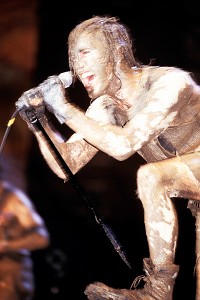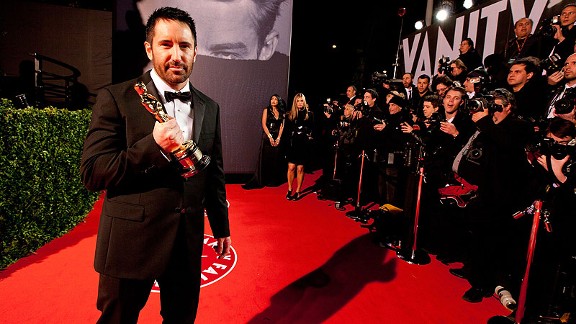|
invito al cielo
Join Date: Mar 2006
Location: fucking Los Angeles
Posts: 14,801
|
Quote:
Several years after Broken's success, Reznor took a dim view of the record, believing that he had caved in to pressure to make his music more aggressive after fans complained about the disparity between Nine Inch Nails' furious concerts and the relatively light Pretty Hate Machine. This criticism was accurate: Compared with the heavy-riffing grunge albums it was invariably lumped with, Pretty Hate Machine sounded like a Depeche Mode record. It was also a natural product of Reznor's roots. "The excitement of hearing a Human League track and thinking, that's all machines, there's no drummer. That was my calling," Reznor told Spin in 1996. "It wasn't the Sex Pistols."
The power of "Happiness in Slavery" was that it was forbidden.4 This made Nine Inch Nails seem dangerous and provocative, even if people couldn't technically be provoked by something that they couldn't watch. It set NIN apart in the puritanical world of alt-rock — as most bands steadfastly avoided behavior that might be construed in any way as cheesy glam-metal decadence, Reznor had the market cornered on lurid depictions of nihilistic lust.5
In this respect, Reznor was alt's truest (i.e., most traditional) rock star. He knew how to tease his audience just long enough before delivering the money shot, which finally arrived two years later in the form of a video MTV could (and did) play approximately 116 times a day. During an era when it was nearly impossible to imagine most rock singers even talking to a groupie, Reznor slipped into sultry Jim Morrison leather and purred about penetrating a willing partner with animalistic glee. "Closer" made Trent Reznor the most alternative of all alt-rock entities: a bona fide sex symbol.
In the realm of '90s rock stars, Trent Reznor typically plays second fiddle to Thom Yorke when it comes to forward thinkers. This is probably related to Reznor's decision to release 2009's The Slip as a free download two years after Radiohead put up In Rainbows online as rock's defining pay-what-you-will album. Yorke was hailed as a record-industry revolutionary while Reznor was lightly patted on the back for being a dutiful follower.6
If we're going to compare Nine Inch Nails with Radiohead (I think I just did, so let's stick with it for a second), Reznor was the one who was prescient in another, arguably more artistically valid way. While Kid A is often described as the first rock record of the '00s — in the sense that it was made by a band formerly known for rousing arena anthems that no longer seemed interested in recording anything remotely resembling rousing arena anthems — I think that distinction actually belongs to The Fragile, which came out one year prior. The Fragile is a choking-hazard of an album, made up of 103 minutes of introverted prog instrumentals and antisocial (and anti-pop) electronica labored over by a brilliant technician who made sure that every perfectly recorded sound was placed precisely in mix, and it felt exactly as cold and uninviting as the average human brain feels after 16 consecutive hours spent contemplating shiny knobs behind a studio console.
[+] Enlarge 
Mick Hutson/Redferns/Getty Images The difference between The Fragile and Kid A is that Radiohead was mostly rewarded for taking a deliberately difficult and (at times) inscrutably insular left turn. If you were a crazy contrarian, you could argue that Kid A is actually a failure in this regard, because it's a self-consciously "alienating" record that made people who cared the most about Radiohead believe even more intensely in the group's integrity. But for Reznor, The Fragile really was a gamble that, in the short term, did not pay off. The album was considered such a disappointment that Interscope Records wouldn't pay for a tour; Reznor had to pay for concerts that promoted a record that Interscope was selling out of his own pocket.
Nine Inch Nails was (and still is) a lot more popular than Radiohead. (Among the mainstream rock audience, The Downward Spiral towers over OK Computer in terms of sales and radio airplay.) This affected the perception of what was essentially a self-indulgent project created in open defiance of audience expectations. What made Radiohead seem brave made Reznor appear delusional and even arrogant.
Reznor waited several years before The Fragile's follow-up, With Teeth. Upon the album's release, he was forced by the media to perform a familiar "walk of shame" routine of making the rounds and saying critical things about a previous project that underperformed commercially in order to publicize a "comeback" record. That Reznor seemed to associate The Fragile with his precarious mental state in the late '90s only fueled the narrative that the album was a mistake. "The Fragile was an album based on a lot of fear," Reznor told Spin in 2005, "because I was afraid as fuck about what was happening to me. That's why there aren't a lot of lyrics on that record. I couldn't fucking think. An unimaginable amount of effort went into that record in a very unfocused way."
It's odd that Reznor seems to assert that the lack of lyrics on The Fragile is somehow a weakness, since it's the appearance of lyrics that typically detracts from other Nine Inch Nails records. Reznor is not an expert at assembling interesting words into great lyrics7 — his talent is in thoughtfully melding oppressively clean mechanics with startling human noise and shaping it into evocative mood music, which is why The Fragile is easily the Nine Inch Nails record I listen to the most. "'The Fragile' is weird because when it came out it felt like everyone hated it to me," Reznor told the New York Times in 2011, "and now it feels like it's everyone's favorite album, fan-wise." But the main reason Reznor disliked The Fragile (for a while, at least) was because he regarded it as a puzzle he could not solve. It compelled him to simplify.
Hesitation Marks lacks the ambition of The Fragile, but it is a similarly illuminating signpost — it clarifies some common misconceptions about Reznor and his work. When heard in retrospect, the cinematic sweep of The Fragile points toward Reznor's future as a film composer. Hesitation Marks, meanwhile, shines a light on Reznor's past, though not necessarily in a nostalgic sense. Rather, it underlines Reznor's core strength as a pop tunesmith who was initially inspired by floppy-haired techno-dandies before he was pointed in the direction of The Land of Rape and Honey.8 I doubt that Reznor set out to clarify his own legacy, but that's what he's done: Hesitation Marks positions Nine Inch Nails as the bridge between '90s alt-rock and the "plastic" '80s groups that alt-rock supposedly set out to destroy.

Christopher Polk/VF11/Getty Images for Vanity Fair Reznor's pop sense has always been his secret weapon. It's what helped restore some of the commercial luster to the Nine Inch Nails brand on With Teeth, which spawned Reznor's most popular radio song of the last 10 years, the New Order–like "The Hand That Feeds." After the positive exposure from Cash's "Hurt" cover, Reznor (consciously or not) crafted With Teeth as a singer-songwriter album — one of the press narratives for the record was that it was an "organic" effort with live instrumentation. (Dave Grohl, the self-styled modern-day Mustafa of rock naturalism, played drums on several tracks.) But what With Teeth was really about for Reznor was getting back to writing hooky songs like "All the Love in the World," which climaxes with a disco-gospel breakdown that flirts with dance music.
Hesitation Marks isn't as tentative about being a collection of pop songs. In fact, it feels downright celebratory. Along with his own history — this is the record where Reznor concedes that Pretty Hate Machine will ultimately outlive The Downward Spiral — Reznor's muse on Hesitation Marks is the early-'80s incarnation of Talking Heads. Nine Inch Nails' excellent career-spanning Lollapalooza performance in August began in a manner similar to David Byrne's "Psycho Killer" cold open from Stop Making Sense. (Reznor also briefly employed former Talking Heads guitarist Adrian Belew in his current backing band.) Musically, the album takes its cues from songs like "Burning Down the House" and "This Must Be the Place (Na´ve Melody)," where Byrne returned to Talking Heads' original guise as a pleasantly twisted twee-pop outfit in a sea of furious New York City punks. Reznor's maturation has followed a similar path: He's never been more comfortable with being who he really was all along.
Along with Welcome Oblivion, the engagingly atmospheric full-length debut by his side project How to Destroy Angels that came out earlier this year, Hesitation Marks represents the least bellicose music of Reznor's career. Given his image at the height of his '90s stardom, growing old has suited Reznor, who turned 48 in May, surprisingly well. Who would've guessed in 1994 that Nine Inch Nails would eventually have a post-rehab "blissed-out middle age" period?
|
Grantland.com today
__________________
Today Rap music is the Lakers

|